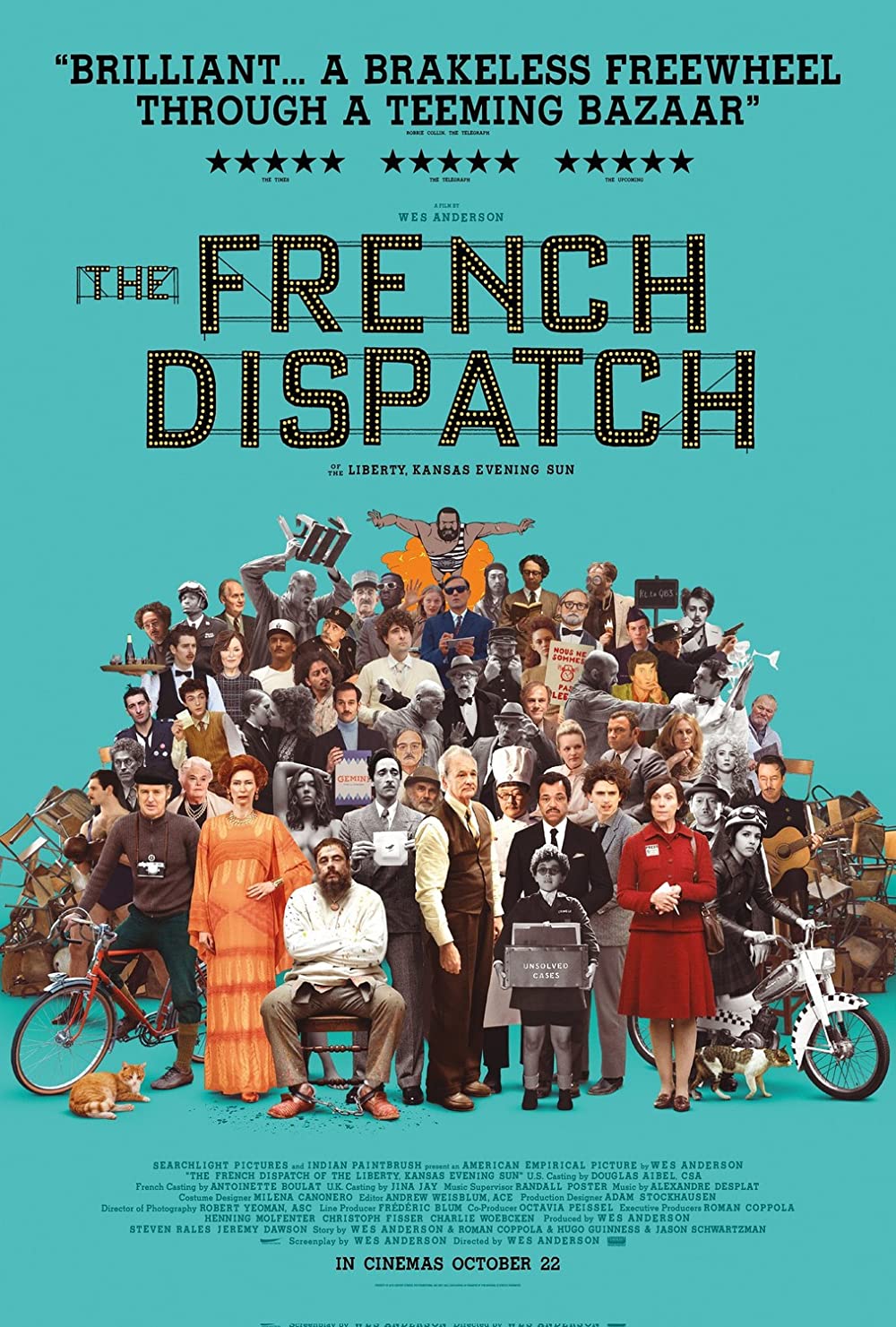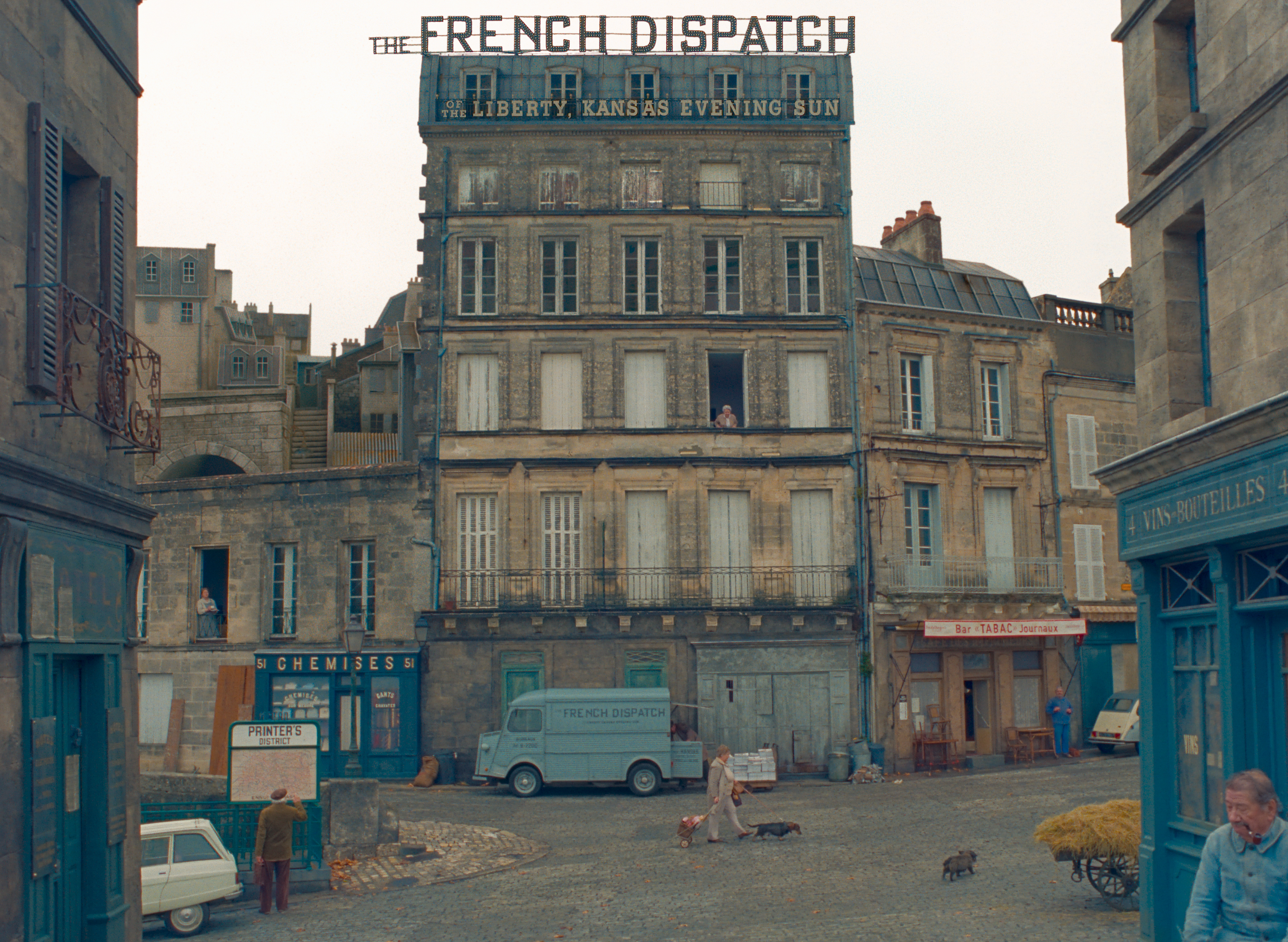Now Playing
Current DJ: K-Tel
Baby Huey & The Babysitters Hard Times from The Baby Huey Story: The Living Legend (Curtom) Add to Collection
Requests? 773-DJ-SONGS or .(JavaScript must be enabled to view this email address)

by Kyle Sanders
The French Dispatch
Dir. Wes Anderson
It makes sense that filmmaker Wes Anderson would direct a movie about an editor of a cultural magazine that "brings the world" to its readers. Every single characteristic that makes up a single frame of his films is so periodically meticulous and exact, that the aesthetic and witty repartee always abounding within view could only be sympathized by someone who oversees the look and content of an ongoing periodical.
There's an obsessive control element, picking apart words and visuals and choosing what stays and what goes. It's a task too tedious for some, but has to be done to maintain familiarity with the audience yet keep them anticipating what comes next. The French Dispatch, Anderson's tenth film, is familiar in tone and content, but offers us something new to keep us from getting bored.

The French Dispatch takes its name from the title of a widely circulated (albeit made up) American magazine based in the fictional French city of Ennui-sur-Blasé. It's editor, Kansas-born Arthur Howitzer Jr. (played by Anderson mainstay and typically droll Bill Murray) has--spoiler alert!--died, leaving his hand-picked staff and beloved writers to gather and write his obituary.
What follows is a collection of content regularly featured in the magazine, categorized by "Local Color" (provided by a beret-adorning Owen Wilson), "Arts and Artists" (orated by Tilda Swinton in a trippy Bob Mackie caftan), "Politics and Poetry" (as observed by the ever stoic Frances McDormand) and "Tastes and Smells" (as typographically recalled by Jeffrey Wright).
Each of these writers have been supported and encouraged by Howitzer Jr., and each provides a story that's perfectly crafted, in equal parts funny and moving, that represent the richly detailed magazine in flawless form.
Anderson's casts seem to snowball over into every new film he releases, maintaining the same faces as the previous project yet adding new names to his massively talented troupe. You have your Anderson go-tos, such as Murray, Wilson, Swinton, and McDormand, and newbies like Timothee Chalamet, Benicio Del Toro, Elisabeth Moss, and Henry Winkler.
This works quite well with The French Dispatch, which is a sort of Sherwood Anderson-esque collection of short stories splashed onto the silver screen. Each story involves a fresh set of characters and settings, merged around the same person.
Despite such a sprawling ensemble, Anderson triumphantly moves them about as if they were ornately designed pieces spread across a vintage chessboard. No role is too small for Anderson's actors (some characters seem to have more words said about them in voice-over than actual lines of dialogue), and despite limited screen time, they make the most out of their characters' oddball status.
As with any Anderson film, The French Dispatch manages to fill every frame with as much detail as possible, be it extravagantly or sparingly. His symmetrical compositions that we've come to admire are most effective in this film, blocked squarely as if we're seeing the page from a magazine come to life.
This sort of art direction has helped establish him as an auteur, yet he still finds ways to surprise us. Particularly, there are some scenes that involve his cast--not the actual frame--freezing in place, an effective visual reminiscent of a comic strip. There's even an incredible animated chase sequence in the style of French comic books, that is just as impressively choreographed and executed as any car chase scene you'd find in an action film.

While it's his visual eye that gets the critical attention, The French Dispatch shows Anderson's sincere love for the written word. The film is a bounty of stories within stories, each creatively presented. While "Local Color" is a whimsical tour of the city's underbelly guided by Wilson on bicycle, the "Arts and Artists" story is told in lecture form, with Swinton presenting a biographical slideshow of an imprisoned artist to an auditorium.
"Politics and Poetry" has McDormand's character observing from the sidelines (and documenting from her bed), pecking away on her typewriter as she revises the manifesto of a student activist, and with "Tastes and Smells," Wright recounts his former adventures while being interviewed on a David Suskind-style talk show.
Each new narrative is told in a refreshing way, never feeling repetitive or stale. It's like sitting in at the infamous Algonquin Table, listening with eager ears of the next lively story from the ever rotating pedigree of witty storytellers.
Anderson is a witty visual storyteller who never ceases to amaze. Just when you think he's topped himself, with rich images and eccentric characters, he comes out with a film like The French Dispatch that surpasses anything he's done before. Like the magazine editor of the film's title, he has his work cut out for him, but each and every time, he gives his audience something new with the content they've already come to expect and adore.
The Chicago International Film Festival runs October 13 - 24. For more information, check out chicagofilmfestival.com and follow @chifilmfest for other updates!
Next entry: Tell Me Lies: Drama and Romance at the Chicago International Film Festival
Previous entry: This Woman’s Work: Female Perspectives at the Chicago International Film Festival